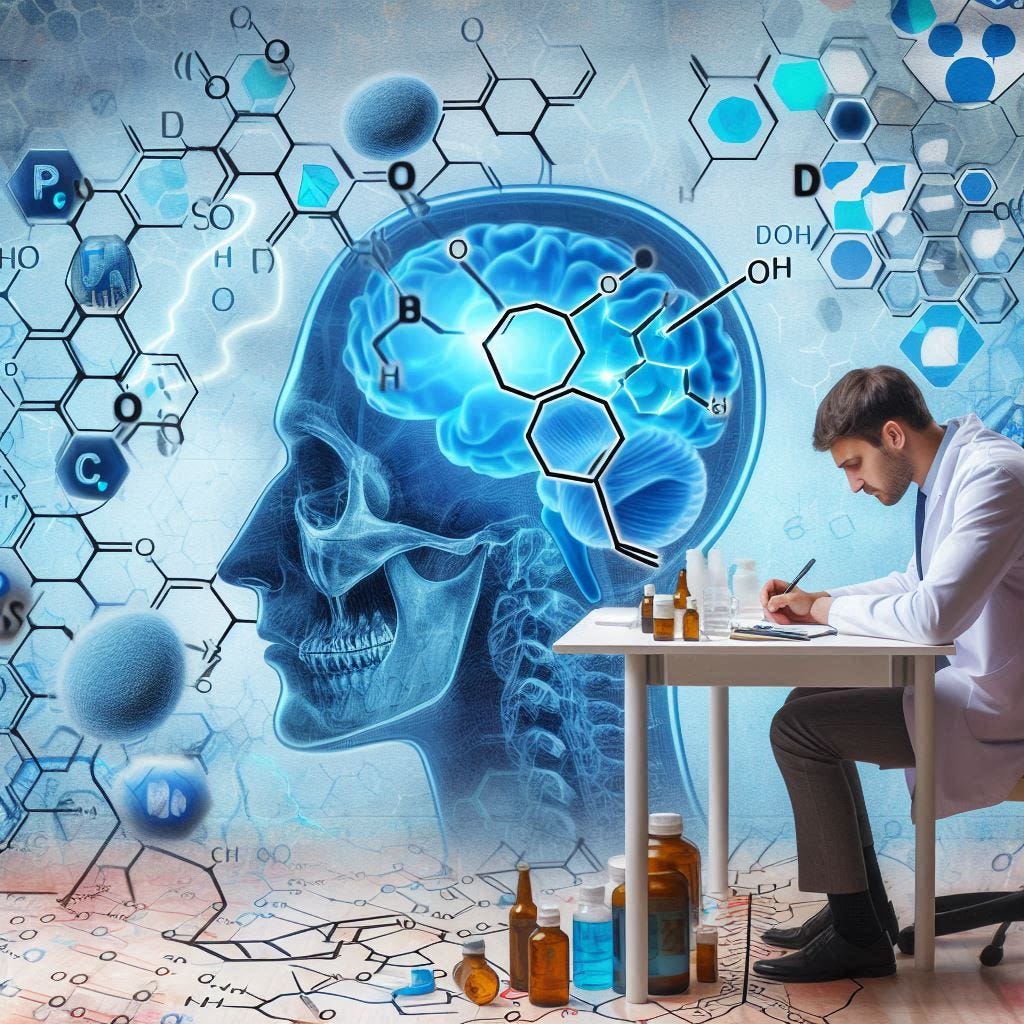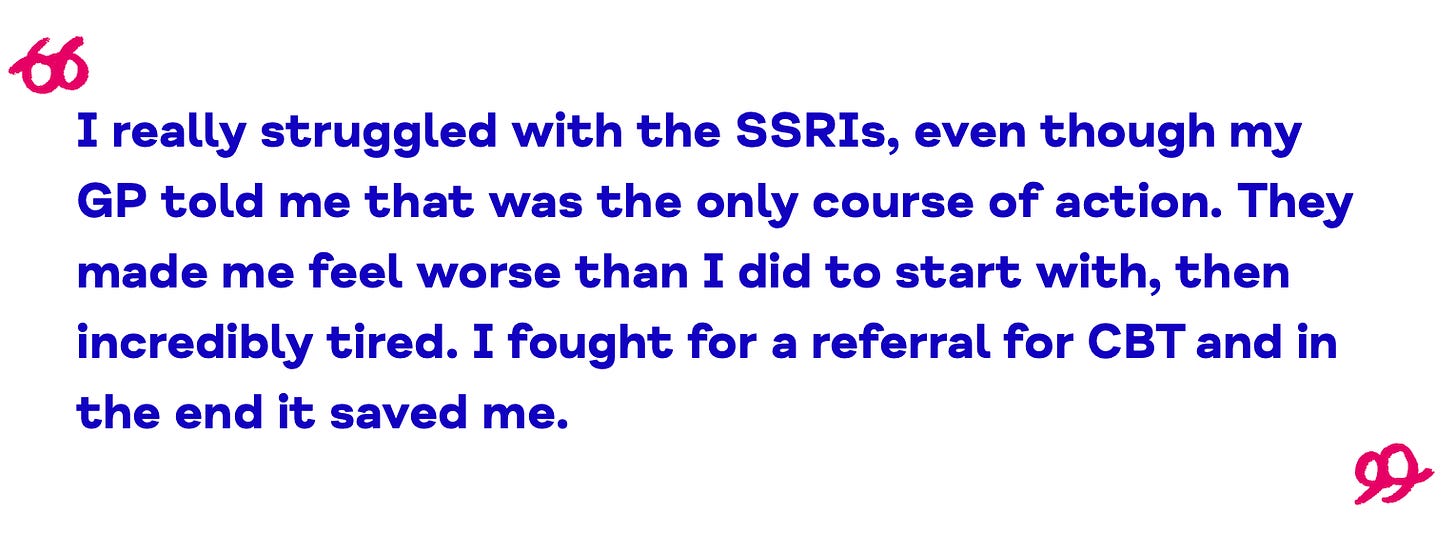Antidepressants – millions take them, but do they work?
Antidepressants. Over 10% of the UK is on them, and more than 2 million people have been on them for over 5 years. You’d hope that for something so widely prescribed (and taken) for a serious health issue, it would be clear that it helps. However, this is far from a given. Let’s unpack.
The ‘chemical imbalance’ theory and the origins of antidepressants
Antidepressants are thought to work because they target chemical imbalances in the brain. Fix the chemical imbalance and you cure depression. This ‘chemical imbalance’ theory was first suggested in the 1960s and was discovered somewhat by accident. In the 1950s doctors were prescribing a particular drug for lung infections and noticed that it improved people’s mood (it didn’t help much with the lung infection though). Surprised by this finding, researchers tried to figure out why this was happening. After testing the drug in rats and rabbits, they discovered that it affected a type of compound known as amines (serotonin is an amine) and so, the chemical imbalance theory was born.
In the 1980s, selective serotonin reuptake inhibitors (SSRIs) were introduced and quickly gained popularity (Prozac is an SSRI). The pharmaceutical industry jumped on this trend, publishing leaflets stating that depression could be linked to imbalances in the brain. Soon professional associations like the American Psychiatric Association, and popular books, like ‘Listening to Prozac’, also made the connection. Fuelled by this emerging narrative, antidepressant use shot up by over five times across the 1990s and 2000s in several countries across Europe and the Americas.
It wasn’t long until some started to take a deeper look at this link. In a book published in 1997, author Professor David Healy, concluded ‘no abnormalities of either catecholamine or 5HT (serotonin) systems have ever been replicated in a manner that has commanded widespread support’. The doubt continued into the 2000s. In 2005, a paper was published titled ‘Serotonin and depression: a disconnect between the advertisements and the scientific literature’, stating that any link between serotonin and depression was exaggerated.
The psychiatrists soon began to answer back. They claimed that the link between depression and neurotransmitters like serotonin was an ‘urban myth’ and not a theory that they had widely popularised. In one article, Ronald Pies, editor-in-Chief Emeritus of Psychiatric Times, and a well-known psychiatrist, stated ‘In the past 30 years, I don’t believe I have ever heard a knowledgeable, well-trained psychiatrist make such a preposterous claim, except perhaps to mock it.’
Commenting on the debate, one article notes: ‘no consistent evidence of an association between markers of reduced serotonin activity or concentration and depression has been found.’ At the same time, recent studies continue to suggest that serotonin levels are implicated in depression.
So, in summary, it’s about as clear as mud. This is important because if the rationale for why we use antidepressants comes into question, it could mean that antidepressants may not be as useful as we thought they were in treating depression.
What does the evidence say?
There is another way to think about it. Rather than worry about theories trying to explain why depression occurs one could simply look at the evidence around antidepressant use: do they help or not?
Unfortunately, that’s not that clear a picture either. One study, published in one of the best journals in the world, reviewed several other reviews, hoping to get a definitive answer. They found that overall, antidepressants did seem to have a significant effect compared to a control group, but that this effect was small (SMD of 0.3 for any statistics afficionados). I spent a while trying to find a more optimistic finding (while maintaining rigour) and the best I could do was just slightly better (SMD of 0.42). Another study suggests that this is equal to roughly a 10% reduction in symptoms. Hardly mind-blowing results. But still, 10% improvement is better than no improvement.
Some have commentated that these studies, which often involve a group of people taking one type of drug and sticking to it, are not representative of medical practice. The point being that in medical practice, you give a patient a drug, if it works for them, great, if it doesn’t, you try something else until you get something that works. This is because different types of antidepressants have different effects (we are still unclear as to why this happens). They argue that if you were to take the average improvement of these drugs after people had found the one that worked for them, it would be higher than the small improvements found in some of the academic studies. Until someone does this exercise, it’s hard to know whether this is true or not.
So once again, not exactly a clear picture of whether antidepressants work or not.
To sum up…
All in all, it’s not entirely clear whether antidepressants always work, how well, and why. For now, they remain one of the main options that doctors and experts recommend to people struggling with low mood, often with caveats.
For example, NHS Inform refers to the chemical imbalance theory but also says ‘this process isn’t fully understood’. Mind, the mental health charity, says in its advice on treatment options: ‘You may find medication that works for you right away. Or you might need to try out a few types of medication before finding one that works for you. Some of us may find that medication isn’t the right treatment at all. You can speak to your doctor about your different options.’ They also include a quote from a patient that struggled with antidepressants:
It seems antidepressants may work for specific individuals. In those cases, we are still not clear if this is to do with imbalances of neurotransmitters in the brain, like serotonin, or some other mechanism we haven’t confirmed yet. For example, SSRIs also affect an amino acid called tryptophan which helps to regulate sleep cycles. As many people with depression often have irregular sleep, this could plausibly be the mechanism by which SSRIs improve depression symptoms. With more and more people struggling with low mood, we hope researchers studying this can get to the bottom of this sooner rather than later.
If you’re looking for alternative and novel options for manage mood. Check out the work we’re doing on probiotics for mood management on our website.
P.S. if you’re on antidepressants, or thinking of starting them, speak to a medical professional if you have any questions or concerns after reading this. This piece is meant to be informative and does not replace (or claim to be) medical advice.







